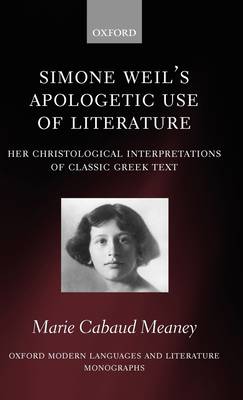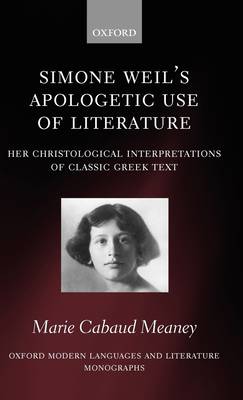
- Retrait gratuit dans votre magasin Club
- 7.000.000 titres dans notre catalogue
- Payer en toute sécurité
- Toujours un magasin près de chez vous
- Retrait gratuit dans votre magasin Club
- 7.000.0000 titres dans notre catalogue
- Payer en toute sécurité
- Toujours un magasin près de chez vous
Simone Weil's Apologetic Use of Literature
Her Christological Interpretation of Ancient Greek Texts
Marie Cabaud Meaney
281,95 €
+ 563 points
Description
Marie Cabaud Meaney looks at Simone Weil's Christological interpretations of the Sophoclean Antigone and Electra, the Iliad and Aeschylus' Prometheus Bound. Apart from her article on the Iliad, Weil's interpretations are not widely known, probably because they are fragmentary and boldly twist the classics, sometimes even contradicting their literal meaning. Meaney argues that Weil had an apologetic purpose in mind: to the spiritual ills of ideology and fanaticism in World War II she wanted to give a spiritual answer, namely the re-Christianization of Europe to which she (though not baptized herself) wished to contribute in some way. To the intellectual agnostics of her day she intended to show through her interpretations that the texts they cherished so much could only be fully understood in light of Christ; to the Catholics she sought to reveal that Catholicism was much more universal than generally believed, since Greek culture already embodied the Christian spirit - perhaps to a greater extent than the Catholic Church ever had. Despite or perhaps because of this apologetic slant, Weil's readings uncover new layers of these familiar texts: Antigone is a Christological figure, combating Creon's ideology of the State by a folly of love that leads her to a Passion in which she experiences an abandonment similar to that of Christ on the Cross. The Iliad depicts a world as yet unredeemed, but which traces objectively the reign of force to which both oppressors and oppressed are subject. Prometheus Bound becomes the vehicle of her theodicy, in which she shows that suffering only makes sense in light of the Cross. But the pinnacle of the spiritual life is described in Electra which, she believes, reflects a mystical experience - something Weil herself had experienced unexpectedly when "Christ himself came down and took her" in November 1938. In order to do justice to Weil's readings, Meaney not only traces her apologetic intentions and explains the manner in which she recasts familiar Christian concepts (thereby letting them come alive - something every good apologist should be able to do), but also situates them among standard approaches used by classicists today, thereby showing that her interpretations truly contribute something new.
Spécifications
Parties prenantes
- Auteur(s) :
- Editeur:
Contenu
- Nombre de pages :
- 264
- Langue:
- Anglais
- Collection :
Caractéristiques
- EAN:
- 9780199212453
- Date de parution :
- 03-02-08
- Format:
- Livre relié
- Format numérique:
- Genaaid
- Dimensions :
- 140 mm x 216 mm
- Poids :
- 430 g

Les avis
Nous publions uniquement les avis qui respectent les conditions requises. Consultez nos conditions pour les avis.






